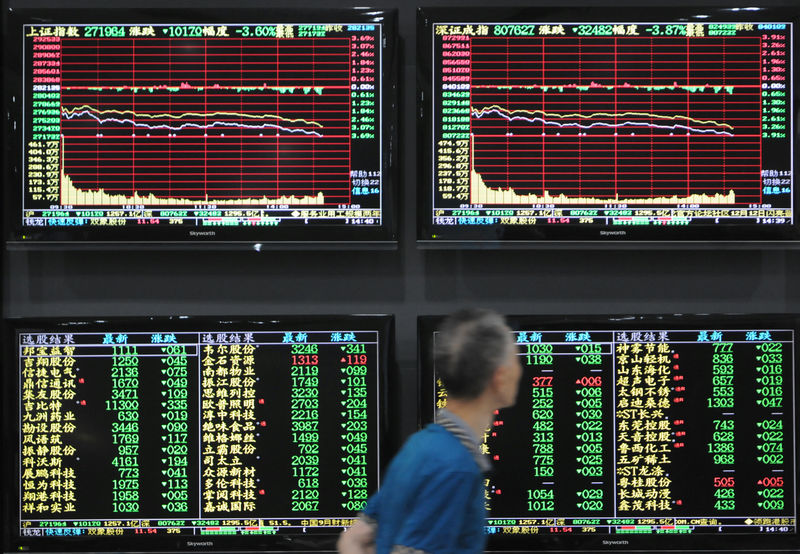SHANGHAI (Reuters) - China stocks tumbled on Monday, as investors back from a long holiday dumped shares across the board despite Beijing's weekend move to spur more lending at a time of growing fears the economic impact of the Sino-U.S. trade war will deepen.
Spot yuan
Beijing has stepped up liquidity support across the financial in recent months as policymakers have focused on calming fears of capital outflows and sought to soothe battered markets as anxiety grows that the tit-for-tat trade war with the United States could deal a damaging blow to the broader economy.
"There's an acute shortage of confidence in the market. Few investors are buying," said Alvin Ngan, a Hong Kong-based analyst at brokerage Zhongtai International.
"China's economy is under heavy downward pressure... and you need time to observe if recent easing measures are effective or not," he added.
On Monday, the blue-chip CSI300 index (CSI300) plummeted 4.3 percent to 3,290.90 points, its sharpest one-day percentage fall since February 2016.
The Shanghai Composite Index (SSEC) lost 3.7 percent, to 2,716.51 points, its worst day since June 19.
For the year, both Chinese indexes are down about 18 percent.
In Hong Kong, the benchmark Hang Seng Index (HSI) dropped 1.4 percent to close at its lowest points in 15 months, extending last week's 4.4 percent loss as investors worried about tensions between the U.S. and China.
Monday was the first chance for mainland investors to react to the escalating trade tensions and a sell-off in Hong Kong markets last week after a week-long holiday on the mainland to celebrate National Day.
On Sunday, the People's Bank of China (PBOC) announced a 100-basis-point cut to banks' reserve requirement ratio (RRR), stepping up efforts to support the economy and calm market worries.
"An RRR cut is not enough to counter the impact of the trade war. The economy is quite weak, and I see a growing number of companies putting their assets up for sale" due to pessimism, said David Dai, general manager of Shanghai Wisdom Investment Co Ltd, a hedge fund.
"And today's fall is not surprising after weak performance in external markets during the holiday."
"MALIGN" EFFORTS
Last week, U.S. Vice President Mike Pence intensified Washington's pressure campaign against Beijing by accusing China of "malign" efforts to undermine President Donald Trump ahead of next month's congressional elections and of reckless military actions in the South China Sea.
And on Friday, Chinese technology stocks listed in Hong Kong, including Lenovo (HK:0992) and ZTE Corp (HK:0763), slumped on a Bloomberg report that the systems of multiple U.S. companies had been compromised by malicious computer chips inserted by Chinese spies.
China's IT sector <.CSIINT> fell sharply on Monday, tumbling over 5 percent as they played catch-up with their Hong Kong peers. Shenzhen-listed shares of ZTE (SZ:000063) was down over 8 percent at close.
Real estate <.CSISFBI>, consumer <.CSI300CS> and healthcare <.CSI300HC> sectors were also among the biggest casualties, all tanking more than 4 percent.
The market's obliviousness toward the RRR cut - China's central bank said the move would inject a net 750 billion yuan ($109.2 billion) in cash into the banking system - highlights concerns that monetary easing alone would do little to heal battered confidence.
"Cutting RRR at a time of relatively ample liquidity in the banking system is not likely to have much effect," wrote Zhao Jian, a finance professor of the University of Jinan.
"Liquidity is not the issue. The issue is the loss of confidence," said Zhao, adding China is in a "liquidity trap" where there's a shortage of credit demand from the real economy, especially the private sector.
(Graphic: Trade tensions in China's stock, currency markets - https://tmsnrt.rs/2PlCZGr)
POLICY DIVERGENCE
China's RRR cut reinforces expectations of more policy easing ahead, putting China on a divergent path of monetary policies with the United States, where 10-year treasuries yields hit seven-year highs as the Federal Reserves keeps raising rates.
Yields of China's 10-year central government bonds have been trending lower this year, standing at 3.633 percent on Monday. That compares with the 3.227 percent yield for U.S. bonds. (US10YT=RR), the highest level since May, 2011.
"The narrowing interest rate differentials between China and the US will exert more downward pressure on the RMB," wrote Nathan Chow, strategist at DBS Group Research.
The spot market
Before trading began on Monday, the PBOC set the midpoint of the yuan's daily trading band
The onshore yuan has weakened about 5.5 percent against the dollar this year.
Reflecting expectations of further yuan weakening, the one-year non-deliverable yuan futures in Hong Kong
"In the face of rising trade frictions, moderate yuan depreciation aids exporters and is what the market expects to see," Tang Xiangbin, currency analyst at China Minsheng Banking Corp said, predicting additional U.S. rate hikes would help strengthen the dollar further.
